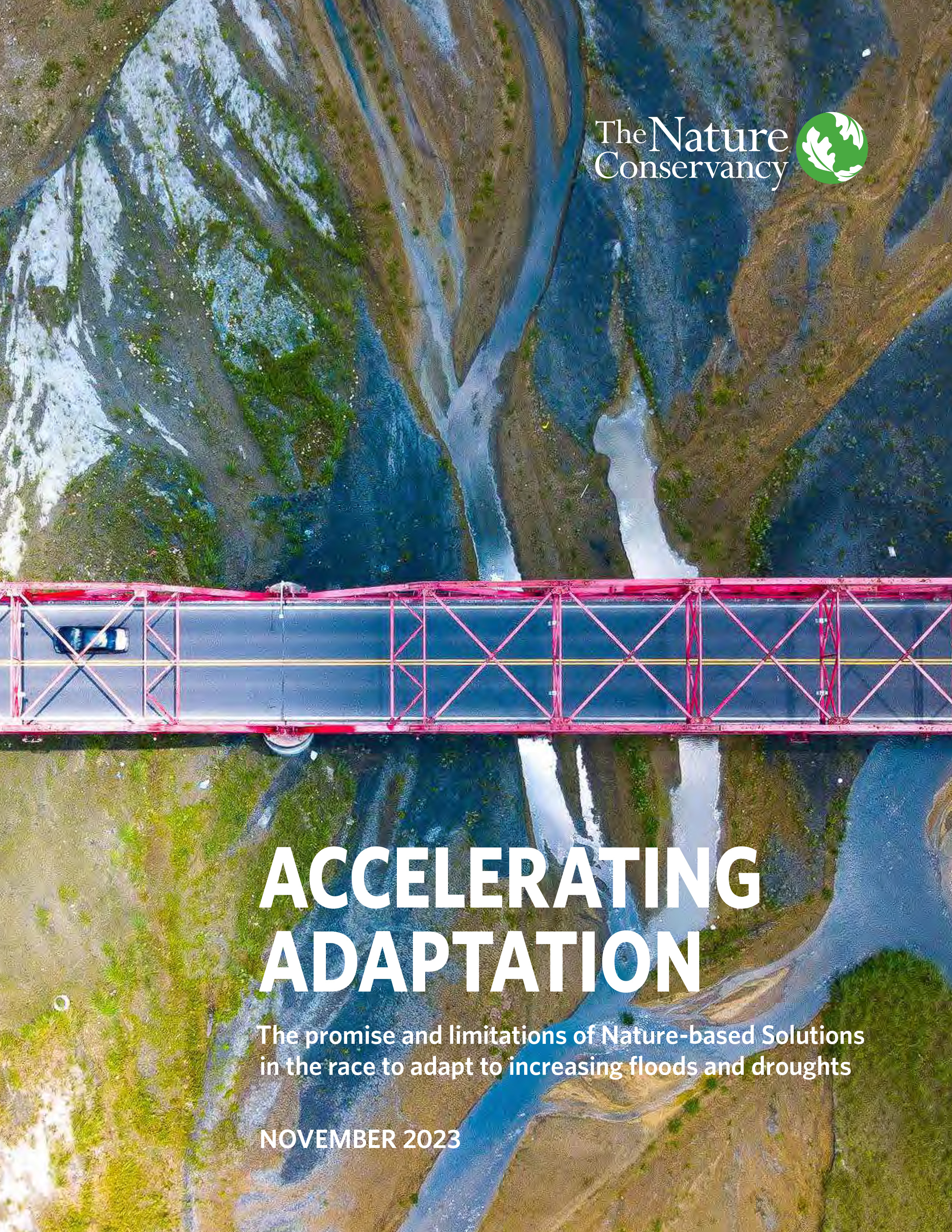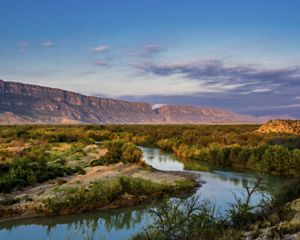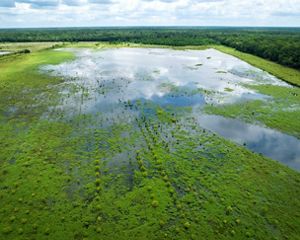Accelerating Adaptation
Exploring the promise and limitations of nature-based solutions in the race to adapt to increasing floods and droughts.
Evidence shows that nature-based solutions (NbS) deployed strategically and in the right places can reduce the impacts of flood and drought and help communities adapt to a rapidly changing climate. But the full potential of NbS is still poorly understood. A new report from The Nature Conservancy (TNC) explores the promise and limits of such investments and offers planners and funders much-needed guidance on how to effectively harness nature to adapt to both a wetter and drier future.
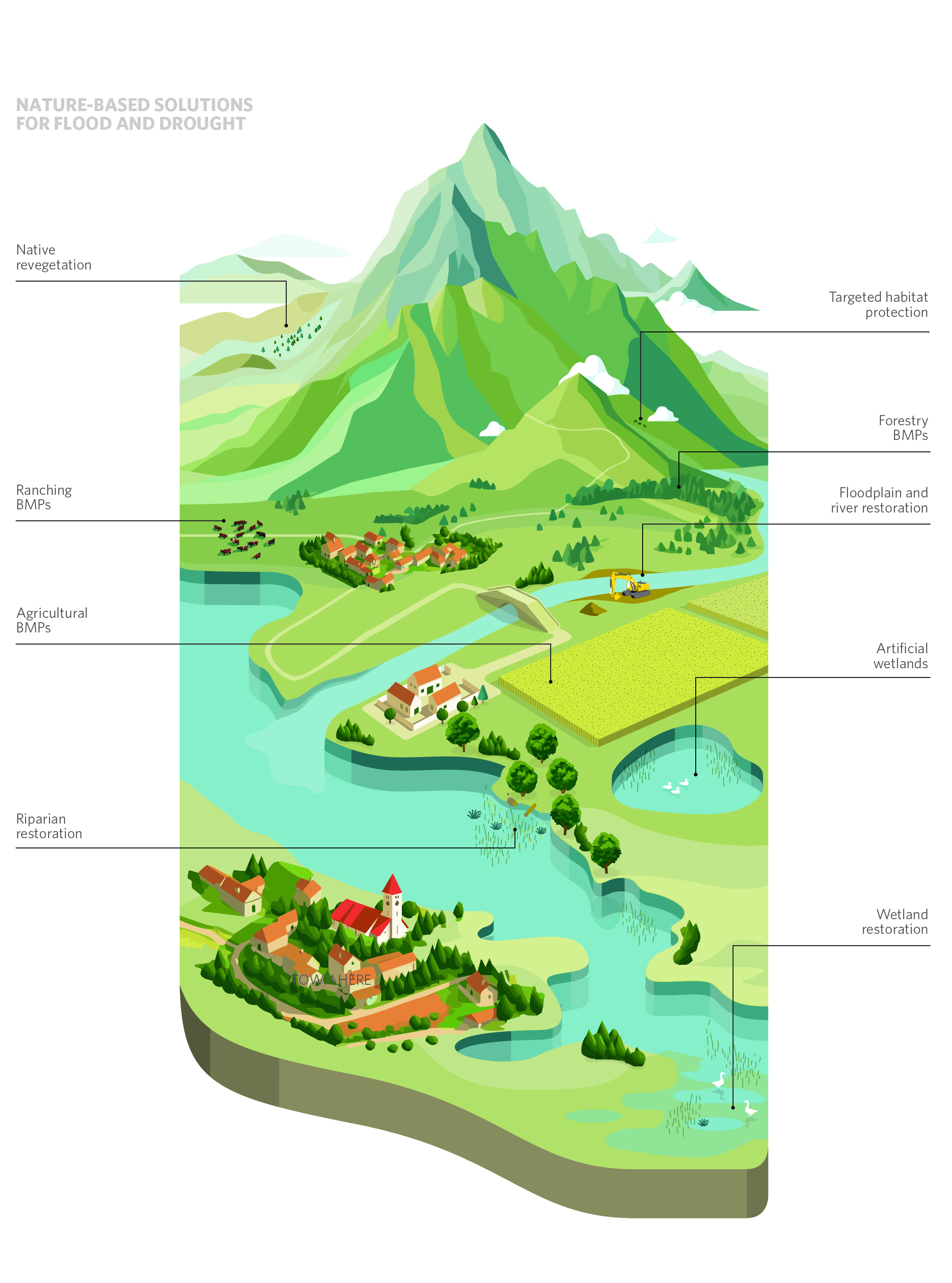
FIGURE 1. Conceptual diagram illustrating different types of Nature-based Solutions (NbS) with potential to address flooding and drought across different landscape types.
Quote
NbS can help reduce the risk of flood and drought in one third of the places across the globe where flood and drought hazards are expected to increase due to climate change.
Key Takeaways From the Report
Flooding and drought are at the center of climate impacts
Water-related hazards like flood and drought are among the most damaging natural disasters. Together, they already impact a fifth of the world’s population, disproportionately affecting vulnerable communities and ecosystems.
Assessments from the Intergovernmental Panel on Climate Change (IPCC) suggest that places like central Europe, the eastern United States, central South America and most of the Asia Pacific region will experience an even wetter future defined by more intense storms and flooding; at the same time, the risk of drought is expected to increase across much of the Americas, Europe, southern Africa, and Australia.
As climate change accelerates and intensifies flood and drought, their societal impacts will also increase unless we can accelerate the adoption of affordable adaptation solutions.
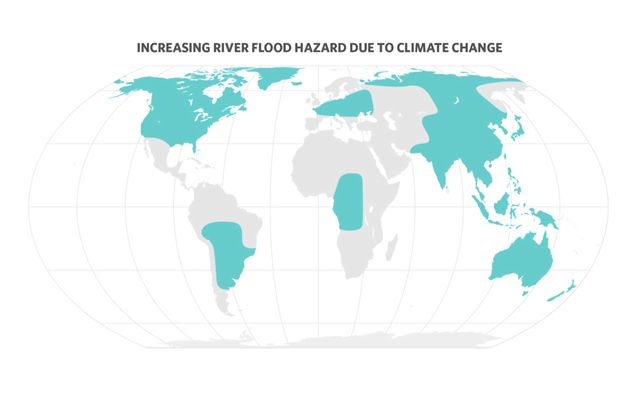
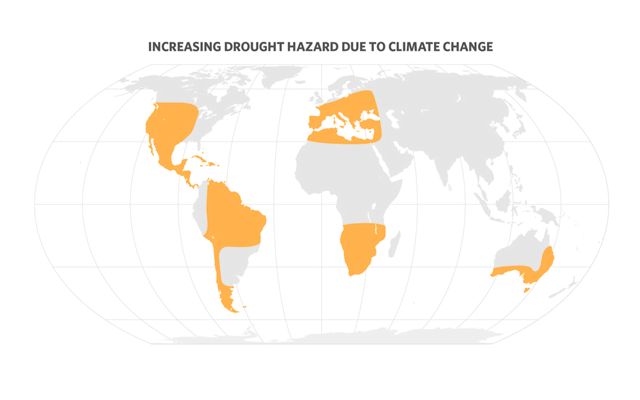
In the race to adapt, nature can help
It is well documented that NbS can play an important role in mitigating the water-related impacts of climate change and should be a key part of global adaptation strategies. But the synergies, trade-offs, and potential magnitude of NbS impacts on future flood and drought are often poorly understood. This has led to a lack of clarity around the opportunity for investment and missed chances to scale NbS appropriately.
New TNC analysis helps to close this knowledge gap, revealing that NbS can help reduce the risk of flood and drought in one third of the places across the globe where flood and drought hazards are expected to increase due to climate change.
The image below reveals the area of opportunity for NbS to address drought and flood hazard. For instance, protection efforts could help reduce flood hazards across more than 14 million square kilometers—equivalent to nearly twice the land area of the contiguous US.
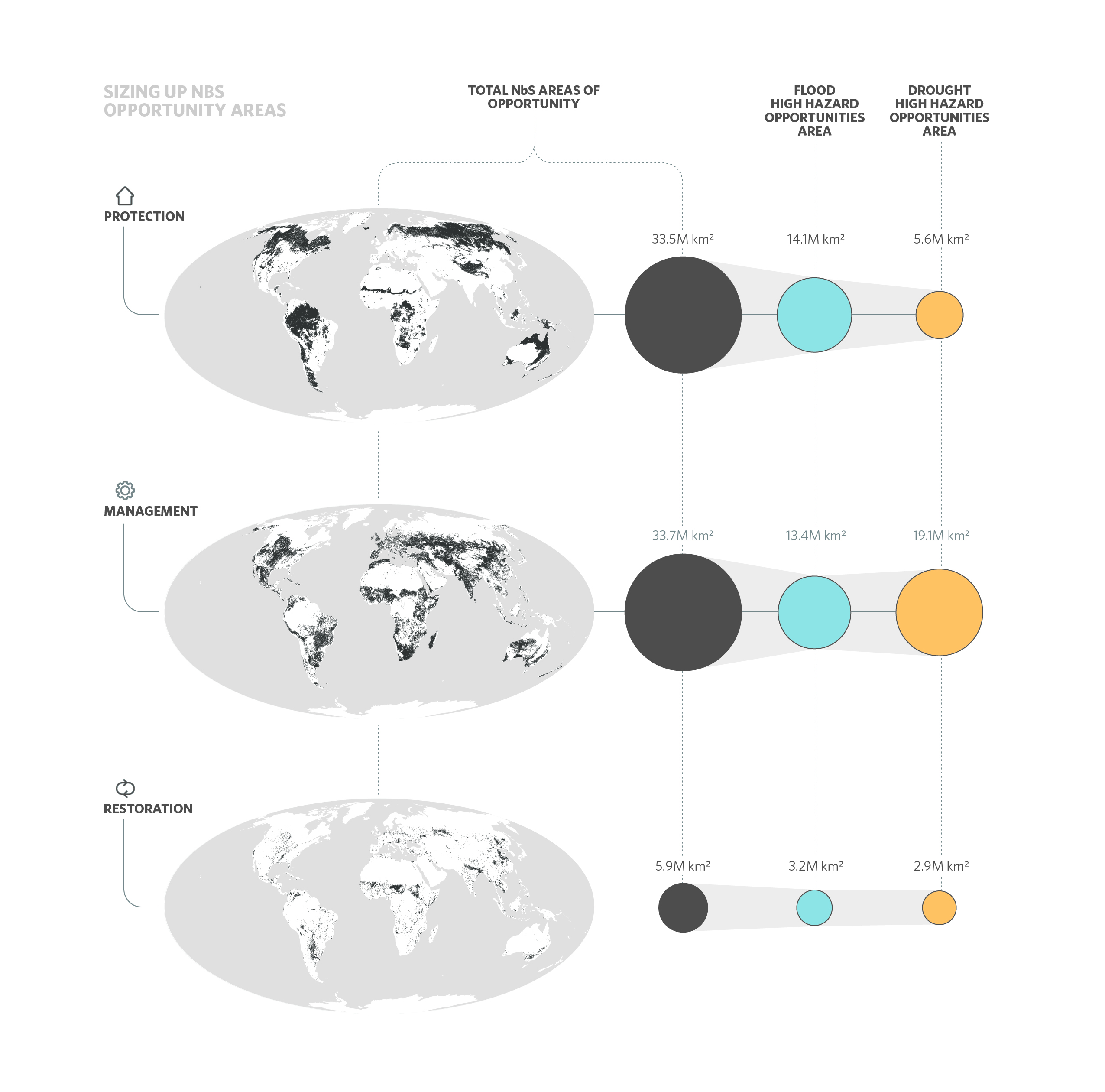
FIGURE 4. Spatial extent of NbS categories (left) and sum of NbS area (right). High hazard areas are identified according to current hazard level (upper tercile) and future hazard change (“increasing” or “uncertain”). See text and Table 1 for information on indicators, data sources and methodology.
NbS can be powerful, but are often part of an integrated suite of solutions
Just as important as understanding the potential for NbS to support adaptation efforts is getting clear about their limitations. Like any investment, NbS come with tradeoffs and are not a silver bullet solution to global adaptation challenges.
NbS combined with other flood and drought mitigation solutions like grey infrastructure and early warning systems, however, can support a robust and effective adaptation plan.
Considering local context is also critical to weighing the synergies and tradeoffs of particular NbS investments. Aquifer recharge during high flow periods, for example, can both reduce the impact of floods and increase water availability longer into dry periods, which could be beneficial in places like California where some communities experience both extreme dry and wet periods. Conversely, although tree planting or reforestation are known to lessen some flood impacts, increasing vegetative cover can also increase evapotranspiration, which may exacerbate drought impacts.
As the analysis explores, understanding the context-specific potential of NbS to address discrete problems (or not) can help planners and funders use NbS more effectively and maximize their impact.

FIGURE 5. Spectrum of green to gray infrastructure solutions to flood and drought.
Financing a way forward
To address the impacts of climate change, build more resilient watersheds for people and nature, and advance shared objectives of water security and climate adaptation sectors, we must scale up the adoption of NbS around the world.
A significant barrier to this imperative is securing adaptation funding. While annual spending on climate mitigation is substantial (and growing), funding flows for climate adaptation represent a drop in the bucket and must be increased by at least three to seven times current spending levels by 2030.
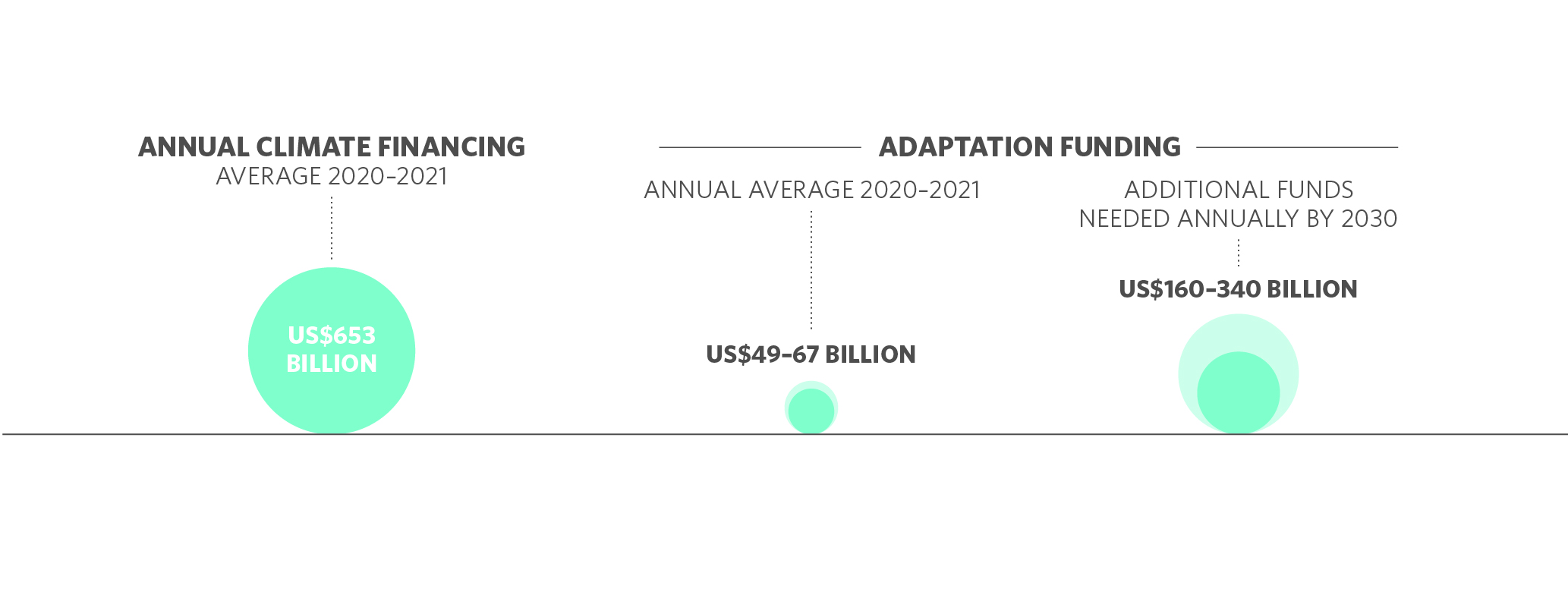
FIGURE 6. While annual funding for climate is substantial (left), funding flows for adaptation (center) are comparatively limited and well below the estimated need for adaptation funding (right).
Next Steps: The Path to Resilience
With the foundational knowledge offered in this report, adaptation planners and funders can more confidently integrate NbS into flood and drought investments.
However, much more is needed to maximize the potential for NbS to build resilience to these increasingly dangerous water-related hazards. Together we must:
Drastically increase the investment in adaptation globally as part of overall climate funding.
Develop additional guidance, tools and protocols that pave the way for integrated adaptation planning.
Enact policies that embed investment in NbS in adaptation planning.
Invest in monitoring and evaluation to help further our understanding about how to best design, implement, and manage NbS for flood and drought.
Integrate NbS into the training and education programs of those managing our land, food, and water systems.
Quote
As the world adapts to the era of climate change, we must find solutions that build resilient, adaptive systems. Nature-based solutions can help.
Download
Explore the promise and limitations of nature-based solutions in the race to adapt to increased flooding and droughts.
DOWNLOADGlobal Insights
Check out our latest thinking and real-world solutions to some of the most complex challenges facing people and the planet today.

